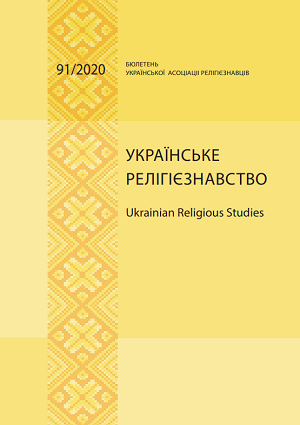Changing attitudes to secularization processes within the theory of modernization of religion
DOI:
https://doi.org/10.32420/2020.91.2144Keywords:
secularization, modernization, conflict, desecularizationAbstract
The article considers the key factors in development of the religious situation in the second half of the twentieth century, which caused a radical change in the attitude to the theory of secularization by sociologists of religion. From the beginning, the theory of secularization was a core part of the general theory of modernization and marked the specifics of modernization`s impact on religious life. However, the inability to explain such phenomena as the sharp rise in religiosity in post-socialist countries, as well as the consistently high level of religiosity in the typically modernist United States, led researchers to abandon the classical theory of secularization. Another reason for the change in the attitude to secularization was the presence of a religious component in numerous political conflicts in the late twentieth and early twenty-first centuries. The religious factor in the conflicts was so unusual and decisive that under its influence the theory of “clash of civilizations” by S. Huntington was born at the end of the twentieth century. Even though the general theory of modernization has not disappeared and still remains popular among sociologists of religion, there is no clear reference to the theory of secularization. Secularization is considered either a random part of modernization processes at certain stages, or one of the options for the development of the religious situation along with counter-secularization, or even completely rejected as a false positivist construct that has not been validated with the real state of affairs.
References
Berger, P. (1980). From secularity to world religions. The Christian Century, Jan. 16, 41-45.
Berger, P. (1999). The Desecularization of the World: A Global Overview. In The Desecularization of the World: Resurgent Religion and World Politics. Washington: Ethics and Public Policy Center, 1-18.
Casanova, J. (1994). Public religions in the modern world. Chicago: The University of Chicago Press.
Chaves, M. (1994). Secularization as Declining Religious Authority. Social Forces, 72, 749-750.
Dokash, V. (2010). Religious Freedom as an Approach to Democracy Implementation. Religious Freedom, 15, 182-189 [In Ukrainian].
Report on the network of religious organizations on 01.01.2020. https://data.gov.ua/dataset/5ed01094-1e32-4f37-a412-faf9e369420b/resource/1fc2bcdb-f0a5-4d2f-bbd2-e666498a738c/download/forma-1.csv
Gensicke, T. (2001). Zur Frage der Erosion eines stabilen Wertefundaments in Religion und Familie. In Werte und Wertewandel in westlichen Gesellschaften - Resultate und Perspektiven der Sozialwissenschaften. Opladen: Leske+Budrich, 107-135.
Horokholinska, I. (2019). Postsecularity: philosophical and theological intentions of modern religiosity. Chernivtsi: ChNU [In Ukrainian].
Inglehart, R. (1997). Modernization and Postmodernization - Cultural, Economic, and political Change in 43 Countries. Princeton: Princeton University Press.
Inglehart, R., Basanez, M., Moreno A. (1998). Human Values and Beliefs: A Cross-Cultural Sourcebook: Political, Religious, sexual, and Economic Norms in 43 Societies: Findings from the 1990-1993 World Values Survey. Ann Arbor: University of Michigan.
Kammeyer, K. C. W., Ritzer G., Yetman N. R. (1994). Sociology: Experiencing changing societies. Boston: Allyn & Bacon.
Krylov, A. (2006). Religion in the Public-Political Life of Kyrgyzstan. Central Asia and Caucasus, 6 (48), 101-108 [In Russian].
Medviedieva, Y. (2016). Religiousness and economic security of the west: to the problem of correlation. Grani, 2 (130), 55-60 [In Ukrainian].
Slobozhannikova, V. (2007). The Confessional Portrait of Contemporary Russia. Proceedings of the Saratov University. Sociology, Politology. 7 (1), 69-74 [In Russian].
Stark, R. (1999). Secularization, R.I.P. Sociology of Religion, 60 (3), 249-273.
Stark, W. (1972). The Sociology of Religion – A study of Christendom. New York: Fordham University Press.
Watersheds of Secularization: the Western Civilization Project and its Global Alternatives (2017). Kyiv: Khalikov publisher [In Russian].
Weigel, G. (1995). Religion and Peace: An Argument Complexified. In Order and Disorder After the Cold War. Cambridge: MIT-Press, 219-233.
Weigel, G. (1999). Roman Catholicism in the Age of John Paul II. In The Desecularization of the World: Resurgent Religion and World Politics. Washington: Ethics and Public Policy Center, 19-35.
Wilson, J. F. (2005). Modernity. In Encyclopedia of religion, 2-nd ed., V. 9. Farmington: Thomson Gale, 6108-6112.
Downloads
Published
Issue
Section
License
Copyright (c) 2020 Юлія Медведєва

This work is licensed under a Creative Commons Attribution-NonCommercial-ShareAlike 4.0 International License.


